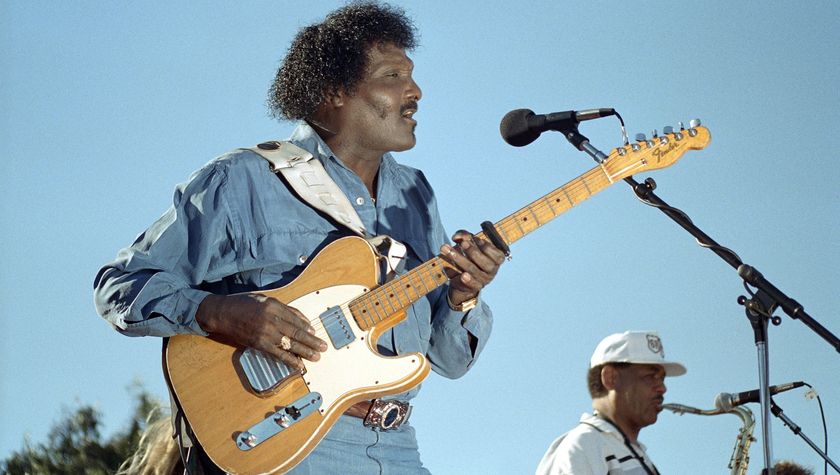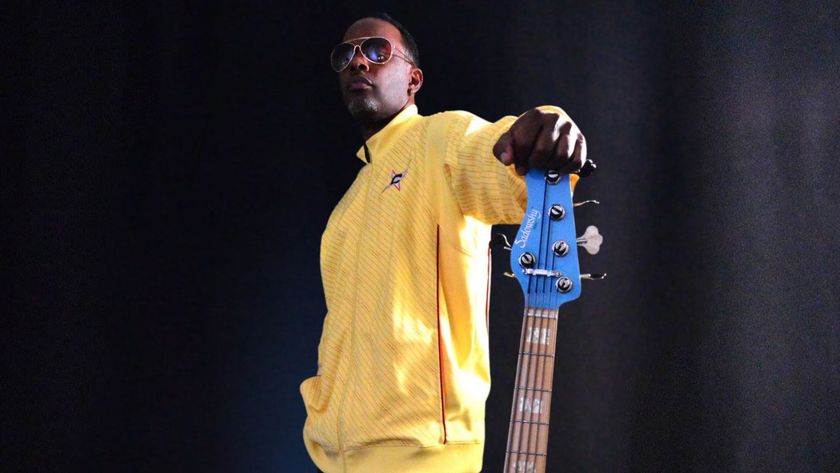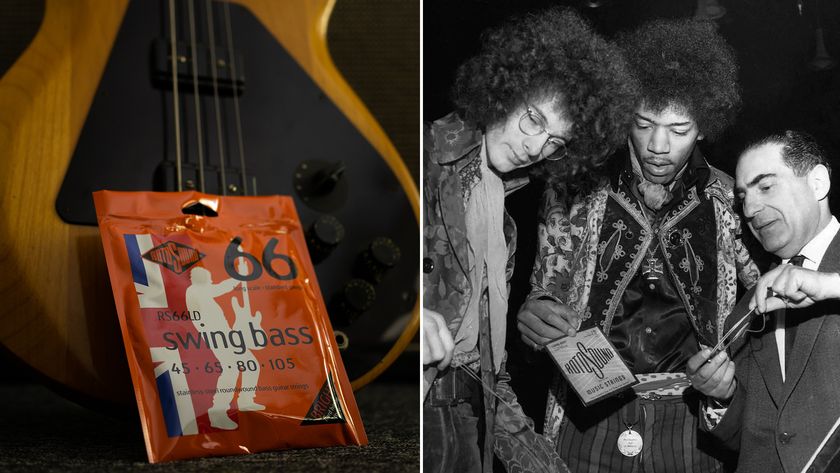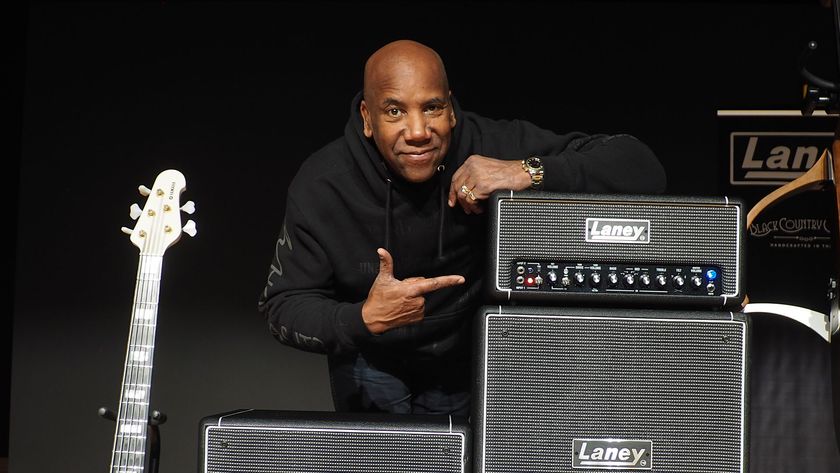Geddy Lee Discusses the New Rush Album, 'Power Windows,' in this 1986 Guitar World Interview
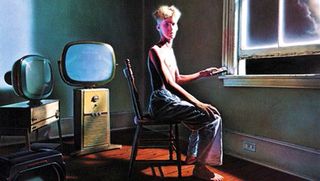
Here's Guitar World's interview with Rush bassist/vocalist Geddy Lee from the May 1986 issue (with Steve Stevens on the cover). The original headline was "Geddy Lee: More Bass, More Space in the Modern World," and the focus of the interview is Rush's new album at the time, Power Windows.
Click here to see a photo gallery of all the 1986 Guitar World covers.
It has been a long, vertiginous and damn exciting roller coaster ride for Rush over the past decade-and-a-half. The group has gone from being unabashed Led Zeppelinites to kings of the concept album to the thinking man's heavy metal band to an uneasy combination of eighties recording styles and seventies relentlessness.
One thing Rush has never done is rest on its collective laurels -- bassist Geddy Lee, guitarist Alex Lifeson and drummer Neil Peart have always been the first to point out the band's shortcomings when they feel legitimate deficiencies have surfaced.
Accordingly, Lee was quick to admit his dissatisfaction with the band's last album, Grace Under Pressure, even though the record, which went platinum, has consolidated the band's position as one of Mercury/Polygram's most important acts.
"We realized with Grace Under Pressure," said Lee on completion of the new album, Power Windows, "that we were not a techno-pop band. We pretended to be from time to time and we realized there are some very dramatic differences between us and that kind of music that will never allow us to have that same sound.
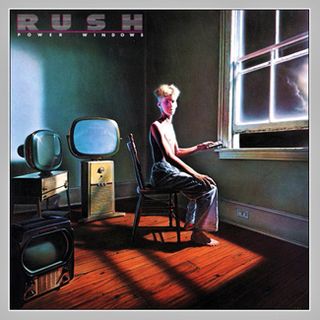
"We have a rhythm section that is hyperactive and very alive and most of those techno-pop sounds are very cool, controlled, minimalistic rhythm sections. No wonder the snare sounds so great. There's nothing else there. That sound was so seductive, that big hi-fi sound. We realized why a lot of those things weren't part of our music, but we realized we could take some of them and use them. We stopped denying what we were a little bit on this album. Last year we were obsessed with getting new sounds."
Get The Pick Newsletter
All the latest guitar news, interviews, lessons, reviews, deals and more, direct to your inbox!
Power Windows is the best Rush album in years, the kind of breakthrough wasn't the realization of a new sound or direction, just the shock of recognition. By scaling down the complexity of their approach, the band has returned to the roots of its sound and the source of its strength.
"I think it is a return to our roots," Lee assented. "We tried to maintain the trio focus and bring out the rock feelings. We definitely wanted this record to rock. That's really where we're most comfortable after all the talk about technology. We love to rock and there are still a lot of heavy rock influences in us. At the same time we wanted to utilize a lot of the technology that's out there. We wanted this record to be both those we wanted to have all those nice modern techno-pop sounds, but it's not until you tear down the secrets of those sounds that you can do it because you can say That's why it sounds like that, that's why Tears For Fears have such a great synthesizer sound. There's no guitar going whang!!! at the same time. That's why the guy's snare sound is so good because he's just playing one little thing and there's lots of room."
Lee gives producer Peter Collins and engineer Jim Barton -– both of whom were working for Rush for the first time -– a lot of the credit for the clean, direct sound that the band generated on Power Windows.
“A lot of that is the sound attitude and the spirit of the performance that Peter Collins wanted to get,” he explained. “I think there was as much energy in Grace on the guitar parts and certainly as much enthusiasm but just because of the nature of the recording it turned out to be a dark sounding record. Peter wanted a bright sounding record. I don't know how much intangibles have to do with it but the atmosphere around this recording was much happier this time than the last. It was a more creative environment."
"I think the engineer, Jim Barton, hears things in a very bright way," Lee continued. "He wanted to give the drum sound a lot of snap, the guitar sound a lot of cleanliness. The bass strings I used, for instance, were extremely light gauge strings, almost like guitar strings, and as a result there wasn't that low-end rumble. It's like we started building the record from a notch up higher all the way through the spectrum."
The new production team encouraged Rush to revamp the group's previously super-meticulous approach to recording in favor of a style that encouraged more spontaneity and gives Power Windows a distinctly "live" sound.
"All of the backing tracks are first-take stuff,” said Lee. "A lot of Neil’s drum sounds were one-take jobs, so it’s really a performance, not a constructed thing. We've never recorded backing tracks this way, it was all Peter Collins' idea. In the past we'd play a song I don't know how many times until we felt we had enough good takes, then we'd sit down and listen to them, pick the best bits and stick them together.
"Peter has one piece of tape and says, This is gonna be the song.' You put down a guide click track, a guide guitar track, some guide keyboards, vocals, building the sound up, except Neil, Alex and I. He sends us out there, we have all this guide stuff, so I don't have to sing and we just play the song. While we're out there playing he's just listening to the drums and the click tracks to see if it's solid. It seemed to work. There wasn't all that wasted energy, the energy is focused-we know this is gonna be the take and if not it's not going to exist because we'll just erase it. Everybody responded very well to it, especially Neil."
Lee pointed out that the fresh approach taken on Power Windows even applied to the songwriting process. "You can't have a good production without good songs," he elaborated, "and a lot of what makes the production is the arrangement, making sure there's enough room for each part to be appreciated, not overlapping so you can't hear it. What we did a lot on guitars this time, which helped the clarity a lot, was to bring out a lot of What Alex plays.
"I've always been a big believer that Alex' parts are far more complex than people give him credit for, especially his verse chording patterns and things like that. Usually he'll be chording and arpeggiating at the same time, going back and forth, which has grown out of years of being a rhythm and lead guitar player. I've always wanted to try splitting his parts up, putting one piece on one track and the other piece on another track.
"We experimented a little bit on Grace with that and it sort of worked out, but at times it got real messy. On this album Peter was suggesting these things, too, and a lot of times it worked. In certain instances, Peter would suggest losing the second half in bits: 'Maybe it's more interesting not to have it be so insistent all the time.' The move was that if something wasn't necessary we experimented with pulling it out. It gave our songs more dynamics. Rush songs have a relentless quality-they start out and rrranngg it keeps coming all the way through. There's dynamics that we feel but it's only because we're so attuned to the subtleties.
"A very subtle dynamic change feels like a big dynamic change to us but maybe to the listener it's too subtle to appreciate so we tried to make this record with bolder strokes. We pulled things out, but tried never to lose the focus of the trio. In 'Manhattan Project' on verse one and verse three it's vocals, drums and keyboards. This is not a typical thing for this band -- let's pull the bass and guitar out? How can you do this to a Rush song? But it worked and I loved the effect of it."
One of the things that delighted Lee most about making Power Windows was his decision to play a lot more bass than he's done on recent albums since he started playing keyboards as well as bass in the band 's lineup.
''I'm playing a lot more bass than in recent history," Lee agreed. " I've really had it with keyboards after the last record. I found that my bass parts were getting relegated to little bits of songs and I was getting frustrated. On this record I said I'm gonna play wherever I can. Before I was so afraid to have bass and keyboards playing at the same time because I knew I wouldn't be able to play both at the same time live. Something's got to go. There are sequencers and stuff but a lot of times I was using bass pedals. It got to a fanatical point where I was so strict with that that I was actually allowing myself to not play bass parts because I wouldn't be able to play them live. I think I. was hurting the song because sometimes you need to feel the bass. We have been imposing strict limitations and I didn't realize how strict they were until we started letting them go, which we did on this record.
"Every time we went to open it up there were all these doubts, but I think it was the right thing to do. I think the songs deserve to be produced. Never mind the live versions-we'll figure something out when the times comes. If there's a little detail that's not in the live show we'll make up for it. So the paranoia of not being able to reproduce something exactly is not tying our hands. We're realizing that the stage is a different place."
On Power Windows Lee recorded exclusively with a Wal bass for the first time. The instrument was lent to Lee by producer Collins and Geddy took to it immediately. "It's a small English company that makes a beautiful bass," Lee explained. "I went there with my arsenal of basses expecting to use either Fenders or Steinbergers, but this Wal sounded better. I'm not sure why. Partly to do with the strings I used, the really thin-gauge strings. The definition was easier to hear when I was playing fast. It really suits my style of playing, because I playa lot of notes and you can hear them better.
"They don 't take up a lot of room, it's not a stodgy bottom-end sound. In a way it was a throwback to my early Rickenbacker sound because it's more twangy that the sound I had on the last record, the bottom end wasn't so low, it was higher up. The kind of electronics in the Wal sound just seemed to work; it was a woody kind of sound. I plugged it in and tried it on the first track, which was 'Big Money,' and it sounded great. We went through the whole record and used that bass. As soon as the record was finished I called the company and told them I've got to have one of those.”
Lee isn't sure yet if he'll take the Wal on the road for the next tour. "I won't know how it sounds until I actually hear it on stage," he said. " In a controlled environment it's so different. I recorded the bass the same way I always did, a direct feed into the board on one track and a small amp, miked, on another track.
"On the Grace Under Pressure tour I used only Steinbergers the whole set. I started out using the Steinbergers and a Fender. I had the Rickenbackers ready in case I wanted to use them but the Steinbergers are very comfortable to use live. I was getting a good sound with them on stage and being trapped with all those keyboards and mikes it was great to have a bass that didn't have a head on it so I could spin around. I'll probably end up using it again on this tour, it sounds so devastating."
Lee pointed out that while he has used synthesizers to handle bass parts in live sets, he generally avoids using any kind of effects on the bass itself. "Sometimes I'll play a bass part on a synth, a JPS, like on 'Red Sector A' from the last album. The same thing with 'The Weapon' from Signals. Sometimes I like the chorusing effect which gives you a kind of watery sound. But I usually don't like to have anything in line-if there 's any chorusing to be done I like it to be done out of the board. I don't like putting things into the line. It makes me feel further away from the sound.
"That's totally the opposite of Alex," Lee pointed out. "Alex likes to have everything but the kitchen sink on his line. On this record, recording the guitars the engineer and producer were very insistent on him not using his effects in line. A lot of the good guitar parts were just straight guitar plugged into an amplifier. They didn't even like him using controls after a while. Every engineer has his own philosophy but the bottom line is if a guy can get a good sound we're happy. So I think a lot of Alex ' guitar sound is improving on this record, and I think it has to do with eliminating a lot of the effects on the line.
"Some of the heavier guitar sounds like on 'Territories' -- those raging guitar sounds -- our engineer had this amp that was set on a Spinal Tap setting -- 11 [hysterics]. This amp, he called it Bertha, you couldn't stand in the room when it was on. So we had the flexibility of going' from this monster sound to a clean, sophisto sound. I thought it was cute going from this modern-sounding guitar to an ancient, crunching dinosaur sound."
In the final analysis, the fun Rush had making Power Windows comes through as one of the intangibles that often lie beyond superior music. But that fun was expressed in part because of the apprehension that the group brought to the studio with them.
"I had a lot of mixed feelings before we started this record," Lee admitted, "because the last one was not a lot of fun. Before we started writing we were saying 'Who are we gonna be? Who are we?' We weren't really sure musically who we were because it seemed we were trying all of these different directions. We didn't know what would come out so we just started writing and became more and more comfortable as we went along. It's the first time completing an album that I've really felt happy in a long time, since Moving Pictures. I felt like everybody gave it their best."

“If any song can unite all generations of rock guitar fans, this is it”: March 2025 Guitar World Editors' Picks
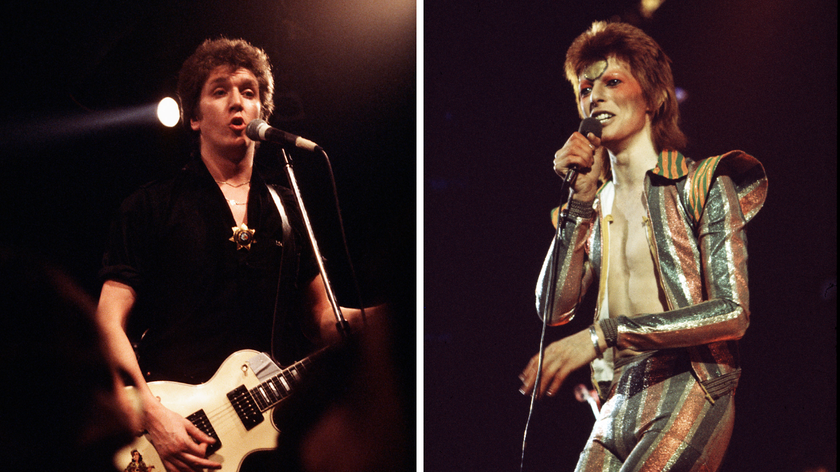
“I nicked some cymbals, the bass player’s amp head and some microphones. I got Bowie’s microphone with his lipstick on it!” On July 3, 1973, David Bowie retired Ziggy Stardust – that same day, Steve Jones stole his equipment
